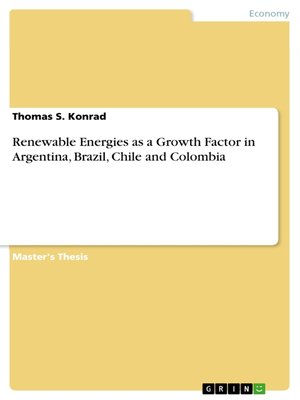Renewable Energies as a Growth Factor in Argentina, Brazil, Chile and Colombia
ebook
By Thomas S. Konrad

Sign up to save your library
With an OverDrive account, you can save your favorite libraries for at-a-glance information about availability. Find out more about OverDrive accounts.
Find this title in Libby, the library reading app by OverDrive.



Search for a digital library with this title
Title found at these libraries:
| Loading... |
Master's Thesis from the year 2012 in the subject Economy - Environment economics, grade: 1,0, Business School INSEEC Paris - Bordeaux, language: English, abstract: This present empirical Master thesis deals with renewable energies as potential growth factor in emerging countries in the context of sustainable economic development. The geographical focus is placed on South America. The sample embraces Argentina, Brazil, Chile and Colombia whose energy markets are interrelated through historical and political commonalities which at the same time constitute collaboration obstacles in energy trade. The concrete research question is whether renewable energies can act as an acceleration factor upon the development of emerging South American economies and refers to the assumption that renewable energies may contribute to economic growth. Following a substantive literature review eight hypotheses were formulated and verified by means of multivariate regression models including different checks and tests regarding: significance of the coefficients (p-value), significance of the regression model (F-Test), autocorrelation (Durbin-Watson-Test), multicollinearity (VIF value), heteroscedasticity (Goldfeld-Quandt-Test), and structural break (Chow-Test). Empirical input data were gathered from publicly available sources, such as the IEA and the World Bank. The results are transparently visualized by numerous figures and tables. In general, the results indicate the existence of positive and negative relations between various dependent and independent variables related to macroeconomic and renewable energy proxies which were used for the forming of hypotheses. Finally, the empirical data gathered in present study provide sufficient evidence to conclude that renewable energies act as an important acceleration factor for the development of the economies of Brazil, Chile and Colombia. In the case of Argentina, a sufficient amount of significant results could not be obtained to make a judgment with respect to the research question.






